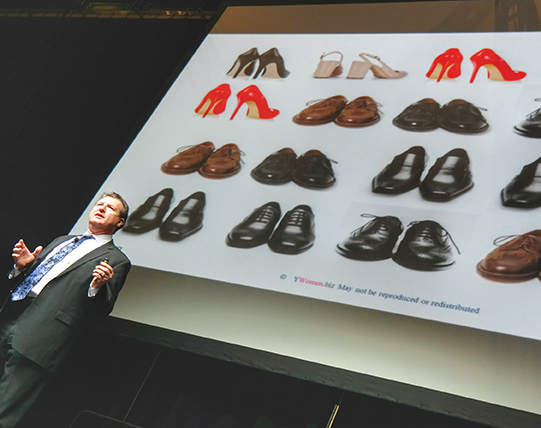
IWLC luncheon keynote speaker Jeffrey Tobias Halter discusses the ratio of men to women in the C-suite on April 26 at the U.S. Cellular Center in downtown Cedar Rapids. (Photo courtesy IWLC)
By Adam Moore
[email protected]
CEDAR RAPIDS—Jeffrey Tobias Halter wants to engage more men in discussions around gender equity in the workplace, although he knows it won’t be easy.
“Quite frankly, most men see no value in the conversation,” Mr. Tobias Halter said in an exclusive interview with the CBJ following his keynote presentation at the April 26 Iowa Women Lead Change (IWLC) Eastern Iowa Conference. “I can have a very long, healthy career by not choosing to [address equity issues].”
That’s likely why Mr. Tobias Halter, a TEDx speaker, author and consultant, spent much of his keynote and the morning men’s track connecting the business and moral imperatives of gender equity.
Even after decades of work, statistics around gender equity in the workplace remain lopsided. Women still make an average of 78 cents on the dollar, and hold only three out of every 20 senior-level positions in the United States. When looking at only C-suite roles, there is just one woman for every 20 men, and she makes just 34 cents to a dollar.
“Men should feel outraged that our societies and businesses only value our daughters at 78 cents,” he said. “That’s how we’re going to drive change for women in the workplace and women in this state.”
For the 30-40 percent of men “who will never get this,” the realities of the coming labor market promise to push them in the right direction. With 10,000 baby boomers retiring each day for the next 10-15 years, “there’s a huge war for talent coming,” Mr. Tobias Halter told the audience. Women, who now earn about 60 percent of all masters degrees, will be a major part of the highly skilled workforce companies will be fighting for.
“You’re going to have to do anything you can to keep every bright, talented woman, minority, and quite frankly, old white guy,” he said. “Talent is scarce.”
Other research cited by Mr. Tobias Halter showed that companies with the highest percentages of women board members outperformed those with the least in return on equity (by 53 percent), return on sales (42 percent) and return on invested capital (66 percent). And he went to lengths to emphasize that men were not losing out by helping women advance, noting that they still receive three out of four promotions in most organizations.
Despite those striking numbers, the reality is that many companies remain stuck in a cycle of “soft talk” about gender and pay equity in the workplace, he said. If anything is to change, men must be engaged in greater numbers, and companies must move toward “a deeply internalized and operational strategy executed with a sense of urgency.”
“The numbers speak for themselves, and yet we’re choosing to do nothing about it,” he said. “We have to start having uncomfortable conversations around gender in this country.”
Mr. Tobias Halter cited Amazon, Target and PwC as companies that are making big strides in gender equity initiatives, and noted that “ultra-progressive programs are where companies are going.” He also urged fathers in the audience to sign his Father of a Daughter pledge, which encourages men to “take responsibility to become more active” in the equitable treatment of women in the workplace.
“It’s simple, it’s painless and it’s a great way to go back and start the conversation,” he said.
The IWLC Eastern Iowa conference drew more than 1,200 women to the DoubleTree by Hilton Cedar Rapids Convention Complex in downtown Cedar Rapids.
CBJ Online Exclusive
Q&A: Jeffrey Tobias Halter
Gender strategist, author, speaker
 Mr. Tobias Halter began his career with Procter & Gamble, and then moved to Coca-Cola during the height of the cola wars, where he became one of its first diversity trainers following a $200 million racial discrimination lawsuit in 2000. He’s now a in-demand speaker and author on the topics of gender equity and male engagement, and president of YWomen, a gender strategy firm. He sat down with the CBJ for an exclusive interview following his keynote at the IWLC Eastern Iowa Conference on April 26 in downtown Cedar Rapids. The following includes edited excerpts from the conversation:
Mr. Tobias Halter began his career with Procter & Gamble, and then moved to Coca-Cola during the height of the cola wars, where he became one of its first diversity trainers following a $200 million racial discrimination lawsuit in 2000. He’s now a in-demand speaker and author on the topics of gender equity and male engagement, and president of YWomen, a gender strategy firm. He sat down with the CBJ for an exclusive interview following his keynote at the IWLC Eastern Iowa Conference on April 26 in downtown Cedar Rapids. The following includes edited excerpts from the conversation:
On the increasing interest in discussions around gender equity issues:
About two years ago, the doors just came off. Everybody realized at the same time that male engagement is the next thing. There’s like three of us in the country doing this [gender equity consulting] work – we all know each other and have worked together. And their business has exploded as well. It’s one of these, we have to stop fixing women and we need to change culture. And that starts with who’s in charge, which is men.
On the ‘gap’ between talk around gender equity in the workplace and action:
There’s no burning platform for us to talk… It gets back to this notion that men and women are having difference experiences in the workplace. I’ll go to a company and talk to their HR group for a couple hours, and then I’ll meet with their senior leadership team, and in just two hours of genuinely listening, I’ll come up with five or six deep, root-cause issues that senior leadership aren’t aware of. And when it comes from a collectiveness of 20 to 50 women, it’s not just idle gossip or rumor – these are things that are on women’s minds and that no one has talked to them about. That’s the power of business resource groups – they can work as a collective voice to senior leadership.
On reasons why some men refuse to engage on gender equity issues:
It’s kind of the backlash issue… One of the things I talk about in my book is that 30-40 percent of men will never get this, for whatever reason. But backlash does exist, and typically it’s personal. They were maybe passed over for a reason, and their manager is either unwilling or not trained to provide accurate feedback, so my default as that man is to say ‘They wanted a woman for that job,” as opposed to saying, “Well, she was just more talented or had more skills.”
And it’s been heightened in this [business] environment, where all we seem to do is restructure and re-org. If you’re 45 or 50 and you’ve got a family, you’re literally looking over your shoulder all the time, because it’s no longer about cutting fat – we’re into bone. And so, if performance doesn’t enable you to keep your job, there’s going to be backlash, and it’s very personal.
On addressing the subjectivity embedded in HR programs and processes:
Here’s an example for you. It’s well-documented that there’s a women’s wage gap in this country. Every CEO can call somebody at his company and say, “I want to see wages by job grade, race and gender.” It’s that easy. But then, what do you do with that? You’re going to have to demonstrate transparency – to say, “We have discovered an issue that exists. I can’t give you all $15,000 raises, but I can commit to you over the next two to three years, we will erase the wage gap, and number two, I will make you whole on a portion of the money you lost out on.” Very few companies are willing to make that commitment, but that’s what has to happen. And that’s unpleasant stuff.
The other compelling factor is, you’ve got legal saying, “If you run that report, it becomes discoverable if we’re ever sued.” But what you see is, in the companies that have made that shift between being really good at this and just being benign, the CEO has said, “Legal, thank you for your advice, we are going to proceed anyway.” So when you look at the DiversityInc list of Top 50 Companies for Diversity, literally every one of them has complete transparency in what goes on in the company, in regards to pay, performance, equity and management.
It takes courage, it’s going to cost you money and there will be backlash. I mentioned Coke – as part of the lawsuit, we had to publish our [wage] numbers in the newspaper. Oh, and by the way, when you publish your numbers, men are angry, women are angry and minorities are angry. Nobody likes the numbers. But the numbers are the numbers. And we’re fooling ourselves if we don’t know what the numbers are.




